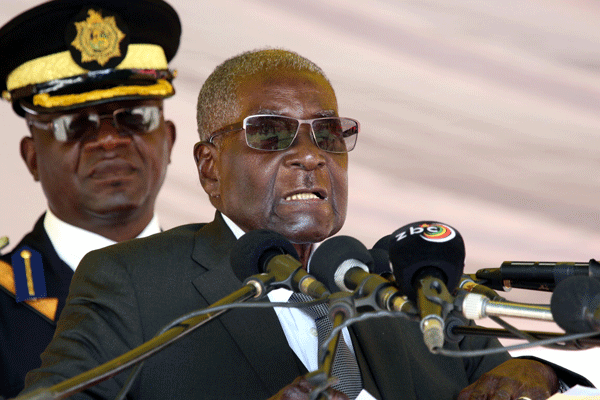
“Zimbabwe is topsy-turvy,’’ Robert Mugabe is telling me. And from where I sit, facing the fallen leader from across his broad desk, in a lavishly appointed reception room in his sprawling mansion on the outskirts of Harare, for once it is hard to find fault with his analysis.
ITV
His henchmen have spent decades making life difficult and sometimes dangerous for journalists.
Mugabe has often denounced the British media as agents of colonialism, “bloody idiots’’ and “terrorists”.
And here I am, smuggled into the inner sanctum, for a heart-to-heart.
Mugabe’s world is indeed topsy-turvy. After 37 years in power, he finds himself in opposition, confined for the most part to this gilded cage – surrounded by high walls and guarded by soldiers — cooped up with his wife and her family.
He wants to tell the world that the new government of his one-time ally Emerson Mnangagwa is “illegitimate’’, that it owes its power to the military. Mnangagwa still calls Mugabe a father figure.
Mugabe accuses him of betrayal.
- Chamisa under fire over US$120K donation
- Mavhunga puts DeMbare into Chibuku quarterfinals
- Pension funds bet on Cabora Bassa oilfields
- Councils defy govt fire tender directive
Keep Reading
“I never thought he whom I have nurtured, brought into government and whose life I worked hard in prison to save as he was threatened with hanging, that one day he would turn against me.”
It is the one real moment of real bitterness. During the course of our interview, he is by turns sad, nostalgic and pugnacious.
Through the fog of great age, his mind seems sharp. And on the occasions it strays, there is his wife, close at hand, to fuss around, to interject, to correct his mistakes.
Grace is our host.
She greets us and ushers us swiftly inside, and even serves us her home-made pizza.
This is the woman derided by many Zimbabweans as “Gucci Grace” for her expensive tastes and love of luxury.
Many too believe she became the power behind the throne — Mugabe’s heir apparent. That’s when the army moved in – and Mugabe and his wife were moved out.
“Imagine. They sent 40 000 soldiers against a woman,’’ she tells me.
“Am I really that dangerous?’’
Mugabe insists it was never his plan to install her as the next president.
“All that is rubbish,’’ he says.
He rejects too the accusation she tried to have Mnangagwa poisoned: “She would never do that, she is a Christian.’’
It makes me feel better about eating the pizza.
Now he’s offering to “help’’ his successor “restore democracy’’, but really this is another round of the factional infighting that has disfigured ruling party politics of Zimbabwe while the country has stagnated.
Elections, that if as free and fair as promised, will grant the new government legitimacy. They are scheduled for a few months’ time.
So Mugabe is lining up with a new opposition group made up of many of his old allies from Zanu PF faces.
But I wonder why Mugabe bothers. He’s 94 and tired.
Why not live out his remaining time, immune from prosecution, on a reported £10 000 a month pension, not to mention the mansion, free flights and fleet of expensive cars? All paid for by Zimbabwe’s cash-strapped state while so many of his countrymen struggle to eat.
As we drive out, I notice that Mugabe has statues of himself erected in the garden. In one stone pose, his arm is raised, as if heralding an imagined crowd in glory and triumph.
He tells me he doesn’t want the presidency back.
So why play power politics again? For his friends? For his family? For his wife? Or just because that is what he has always done.










